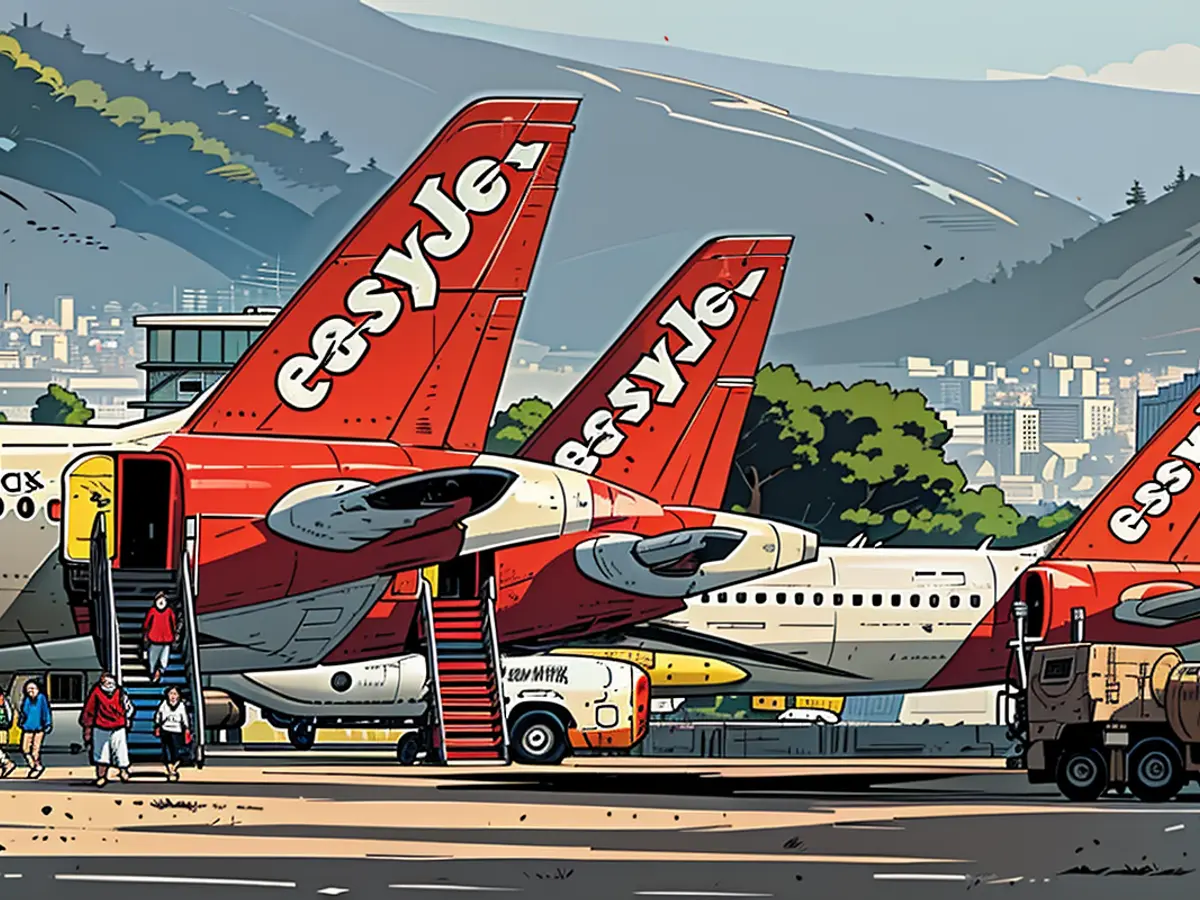"At times, expenditures have doubled compared to their levels five years prior."
Airfare expenses in Germany are soaring due to steep fees and taxes imposed on airlines. In an interview, Easyjet's Germany CEO Stephan Erler discusses whether the budget airline can continue offering low-priced flights and why such high taxes are unwarranted.
Is your business structure becoming less appealing, considering that flying has lost its allure for many due to environmental concerns, escalating costs, and airport turmoil?
Stephan Erler: No, flying remains highly enticing, and the statistics back this up. The industry and Easyjet have bounced back to pre-Covid levels, and in some cases, even surpassed them. While certain passenger demographics like business travelers are flying less, leisure and recreational travel have gained even more significance. This trend is observed across all European markets. Nevertheless, Germany falls behind compared to other nations, currently at 80% of pre-pandemic connections, whereas other European countries are at 90, 100, or even 110%.
Why have flight prices skyrocketed in Germany, even within the low-cost segment?
Costs have surged less in Germany than many might think. Here, we're shoulderburdened with more taxes and fees at our bases, including the escalated air traffic tax implemented in May. We're also faced with higher charges for security checks due to wage agreements and for German air traffic control, where airlines are still paying off pandemic-related expenses the government failed to manage. In certain cases, these costs have surged to twice their former levels over the past five years.
Are these challenges exclusive to Germany?
In some European nations, costs have also risen, but in others, fees have been reduced. In Germany, price hikes are due to not only increased expenses but also a scarcity of supply amidst robust demand. Obviously, airlines grow where the overall package is most favorable for them.
Can you, as a low-cost airline, still maintain ridiculously low prices in Germany under these circumstances?
Our typical ticket price is still 75 euros, but inflation and rising fees are impacting us too, leading us to pass on some cost increases to passengers. However, we continue to offer an excellent value-for-money proposition within Europe and to Mediterranean destinations. Regrettably, we're noticing that some passenger groups are wavering in their decision to fly.
In the face of competition with established airlines, low-cost carriers have grown more cautious. Are you running out of ammunition?
I believe this perception is overly German. The typical fare with established airlines still significantly exceeds ours. We aim to provide more affordable flight options from Germany, but our fleet is not infinite, additionally stymied by aircraft delivery issues with manufacturers. Consequently, we dispatch an aircraft where it generates the best profit. If I have bases in Europe with more attractive conditions, I'll deploy my aircraft there instead of Germany, even if I'd prefer otherwise.
Why has Ryanair, Eurowings, and Condor decided to trim connections in Germany recently? What role does location play for Easyjet?
(No further text provided in the original)
Germany is one of our primary markets, albeit with a smaller flight offering compared to the UK, Spain, France, or Switzerland. When the circumstances improve, we can expand our operations here once more. We engage in dialogues with politics at all levels, local, regional, and federal, to highlight what works in other markets.
Is the government willing to cooperate with you?
It's not about collaboration, but rather recognition that the loss of flight connections negatively affects Germany economically. We observe that other European markets efficiently manage regulatory guidelines and security controls. No one is advocating the abolition of the air traffic tax, but there should have been consensus that it be used for sustainable fuel research. This has been significantly downsized, whereas Easyjet and other industry players invest millions annually to meet EU regulations and climate objectives.
Despite reported cost increases, you've managed to boost profits and revenue in the third quarter of your business year. Your stock has also rebounded from the tumultuous Covid era and has been on an upward trajectory since mid-September. Will this upward trend continue throughout the entire year?
We will announce the full-year results in November and can preliminarily state that it has developed as anticipated. We anticipate to surpass last year's profit of 450 million euros. This is achieved through more passengers, better average load factors surpassing 90%, and an enhanced margin. Despite all fee increases, we've managed to keep our costs in check. The full-year results will confirm the Q3 trend.
Don't these high fees and taxes in Germany have justification given the aviation sector's significant environmental impact?
If the air traffic tax seeks to reduce flying, it is fundamentally misguided because the aircraft will simply take off elsewhere. This doesn't result in less flying, but the planes will be less full and thus have a worse carbon footprint. We aim to fly more sustainably by operating fuller aircraft equipped with the latest engines and fuels.
Where do you stand on sustainability?
In the past four years, we've already reduced our emissions by a third through investments in more efficient flight operations. Across Europe, the industry could save ten percent of emissions using the current fleet by flying more efficiently and, for example, directly from Berlin to Paris or London. However, airspace boundaries remain, and we've been advocating for their resolution since 2008 – without progress. This remains incomprehensible for airlines like ours.
You're focusing on the development of a hydrogen propulsion system with engine manufacturer Rolls Royce. How does this plan work?
Hydrogen is a viable option for powering aircraft over short to medium distances, given its range capabilities. The real challenge lies in scaling up its use to accommodate more than 100 seats, which serves as our benchmark for engine and aircraft manufacturers. There are numerous ways to implement this technology, with numerous players pushing their individual projects forward. By the mid-2030s, we anticipate investing in innovative engine technologies and aircraft designs.
Will we be flying in hydrogen-powered airplanes a decade from now? It sounds almost too good to be true.
Our partners are hopeful about reaching this milestone ahead of schedule. We aim to be among the first adopters of these cleaner, more sustainable technologies. However, the necessary infrastructure and regulatory frameworks need to be established in the coming years. We're actively advocating for this change with policymakers and have garnered significant interest thus far. Yet, financial support and an appropriate regulatory environment are crucial. Business and government must work together on this.
Are other companies doubting their hydrogen projects right now? Isn't it a risky proposition to invest in hydrogen-powered aviation?
Labeling it as a risky proposition would be overly pessimistic. Certainly, there will be challenges and setbacks, but we remain optimistic about the potential benefits. From an environmental, social, and financial standpoint, it's essential to pursue cleaner energy solutions. We're in regular communication with other airlines operating similar aircraft types and collaborating with Airbus on a project to gauge the ground infrastructure required for hydrogen-powered aircraft.
How much capital are you committing to these initiatives?
It's a substantial seven-figure investment yet spread across various sustainability projects, making it difficult to assign a specific monetary value within a fiscal year.
Are you primarily focusing on the aircraft's propulsion system over passenger comfort, given the recent issues with Boeing? You only use Airbus planes.
We've been loyal Airbus customers for decades, appreciating their standardized fleet for its lower training and maintenance costs. Our order book with Airbus extends to 2034, with over 300 planes and options beyond. Although problems with Boeing this year have led to a tight aircraft market, we're unable to procure additional planes in the short term. However, we're aware of the industry's need for increased capacity and share this concern publicly.
Given the high fees and taxes at German airports, are there alternatives for passengers seeking affordable flights?
Due to these costs, some passengers might consider flying from neighbouring airports in other countries. While it may add to their travel time, it could result in significant savings.
Despite the challenges, how does Easyjet plan to maintain its presence at German airports?
Easyjet continues to engage in dialogue with political bodies at different levels to advocate for more favourable conditions. By highlighting what works in other European markets, they aim to create a more appealing business environment in Germany.









